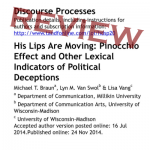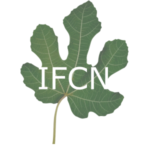Searching for Answers With Michael T. Braun
We emphasize at the outset our gratitude to Dr. Braun for sharing with us a copy of HLAM.
After we received and read HLAM, we sent some interview questions to Braun. While we did not receive answers to those questions we did receive a set of very interesting responses. We’re electing to publish the email exchange with Braun’s words redacted. We reserve the full right to publish the content of those responses save for Braun’s final email in the set.
It is our understanding that Braun does not want any of the material published.
This exchange took place on Nov. 30, 2015.
ZFC:
Thanks again for so promptly sharing your work.
As it was well known to me that PolitiFact makes no attempt to rule on whether political figures intend to deceive their audiences, I reacted with surprise over the content of the NPR review of your study.
I’m going to pose a set of interview questions in the remainder of this message. I hope you’ll consider addressing them. I intend to write a review of your study and make use of your explanations if you’re kind enough to provide them. The Zebra Fact Check website, as one of its commitments to transparency, makes the full relevant text of interviews available to readers.
Q1 The term “lie” may refer to a merely false statement or to an intentionally misleading statement. That distinction is ignored in the bulk of your paper but is addressed in the section addressing limitations. Could you describe, in simplified language, why it doesn’t matter for this research whether the statements ruled false were intended to deceive?
Q2 Your paper describes PolitiFact’s distinctions between “truth” and “lie” as objective, albeit perhaps subject to selection bias. What is the primary rationale you would use to support that judgment of objectivity? If you offer more than one rationale please identify the one you judge as the strongest.
Q3 Table 1 in your paper offers six examples of statements PolitiFact ruled as either truth or lie. One of the statements ruled true contains significant falsehood. Another is probably hyperbole (exaggeration not intended to be taken literally). Problems with faulty categorization may affect the reliability of your research. Was an error rate in PolitiFact’s rulings contemplated?
Q4 At your request, I’ll be happy to share the details justifying my claims from Q3. Would you be willing to share the list of PolitiFact rulings you used as the basis for your research?
BRAUN:
************* * ***** **** **** ** ******* **** **********
*** ***** ** ***** ** ***** ** **** ** * ***** ***** ** ********** ********** ** ******** **** **** ***** ***** ********** ******** * ** ********* ** **** ****** *** **** ***** ******** ******* ******** **** **** *** ****** *** *** *** *********** ** ** ******** **** ********** ********** ********* *** ******** **** **** ** *** **** ********* ************ ******* ** *** ****** ****** ******* * ********* ** ****** **** **** **** ** *** ****** **** ** ********* ** ******** * **** *** ****** ** ***** *** **** *********** *** **** ** ******** * ****** ** ***** *********** ****** **** ********* ***** ** ** **** ****** *** ***** ****** *** ******* *** ** ****** *** ************ *** **** ** ********** ** ******** ** *** ********* **** *********** **** **** ******* ** **** ***** ** ******** *** ***** **** ****** ********** ** *** ************
ZFC:
I don’t wish to repay your courtesy by publishing anything damaging: Please bear with me.
When you reply by email to somebody representing themselves as a journalist, you’re giving permission to publish your response unless you stipulate “off the record” or “deep background” or the like. I’m emphasizing this because your response feeds into one of my concerns about our society’s sources of high-quality information. To illustrate:
John McCain’s statement on waterboarding (from your Table 1) is based primarily on an article published in the Columbia Journal of Transnational Law by Judge Evan Wallach. Wallach’s reasoning was poor and he equivocated often. The CJOTN is a student journal and the editors apparently didn’t give Wallach’s submission much attention before publishing it. Bottom line: There never was an “charge” of waterboarding. The Japanese in question were prosecuted for violating the laws of war, which in the context of the trials meant failing to treat POWs according to those Geneva Conventions applicable to Japan. Wallach offers no example of any Japanese person convicted of and hanged for “waterboarding.” First the “waterboarding” technique overwhelmingly preferred by the Japanese was literal drowning, not simulated drowning. Second, the “water cure” torture described in the trials was nearly always (perhaps always) accompanied by a list of other mistreatments, such as burning POWs with cigarettes. How would it then follow that the Japanese were hanged for waterboarding?
Few question these types of accounts because they are published in reputable journals.
When you write “** ******* ** *** ********* **** *********** **** **** ******* ** **** **** ** ******** ******** **** ****** ********** ** *** **********” it seizes my attention very quickly. I would like to use the response you gave, but I’ll give you a Mulligan if it’s something you would strongly prefer I leave unpublished.
BRAUN
*** ****** *** *** **** ** ****** **** ***** ****** **** **** **** **** ** ** **** ** ***** ***** ********** ******** ** *******
ZFC
I apologize for failing to make my point clear.
This has nothing directly to do with your paper. This has to do with my enthusiasm about publishing the response you sent me as it relates to the issue of academic publishing.
You may not be aware the journalistic justification for publishing anything we get by email that isn’t explicitly restricted. So to pare my point down to essentials: Is it perfectly fine with you if I publish your response?
BRAUN
**** ***** ** *** ***** * *** ******* * ** *** **** ***** *********** *** ********* ** ******** *** ******* ** *** ***** *********** *** ********* ** ** ******* ** *** ******** ** ******** ******** ***** ******** ******* ********* ***********
ZFC
“**** ***** ** *** ***** * *** *******”
It looked to me as though you were making the point that you didn’t care whether using the PolitiFact material for your research was solid science so long as it was accepted to the point of enabling you to publish your work.
That’s what makes your response to [sic] interesting, and since the position is controversial I’m trying to find out whether you’re comfortable having it published (“** ******** ** *** ********* **** *********** **** **** ******* ** **** **** ** ******** ******** **** ****** ********** ** *** *********”).
Could I have misinterpreted Braun’s remarks? Sure. On the other hand, Braun does not want his remarks published. We think transparency is Braun’s best bet if my interpretation of his statement was way off track.
We think journalists telling the story of the HLAM research should ask questions like the ones we asked.
Hopefully those questions will get some answers someday.
We would enthusiastically welcome and respond in print to comments or criticisms from any of the authors of HLAM.
Pages: 1 2



